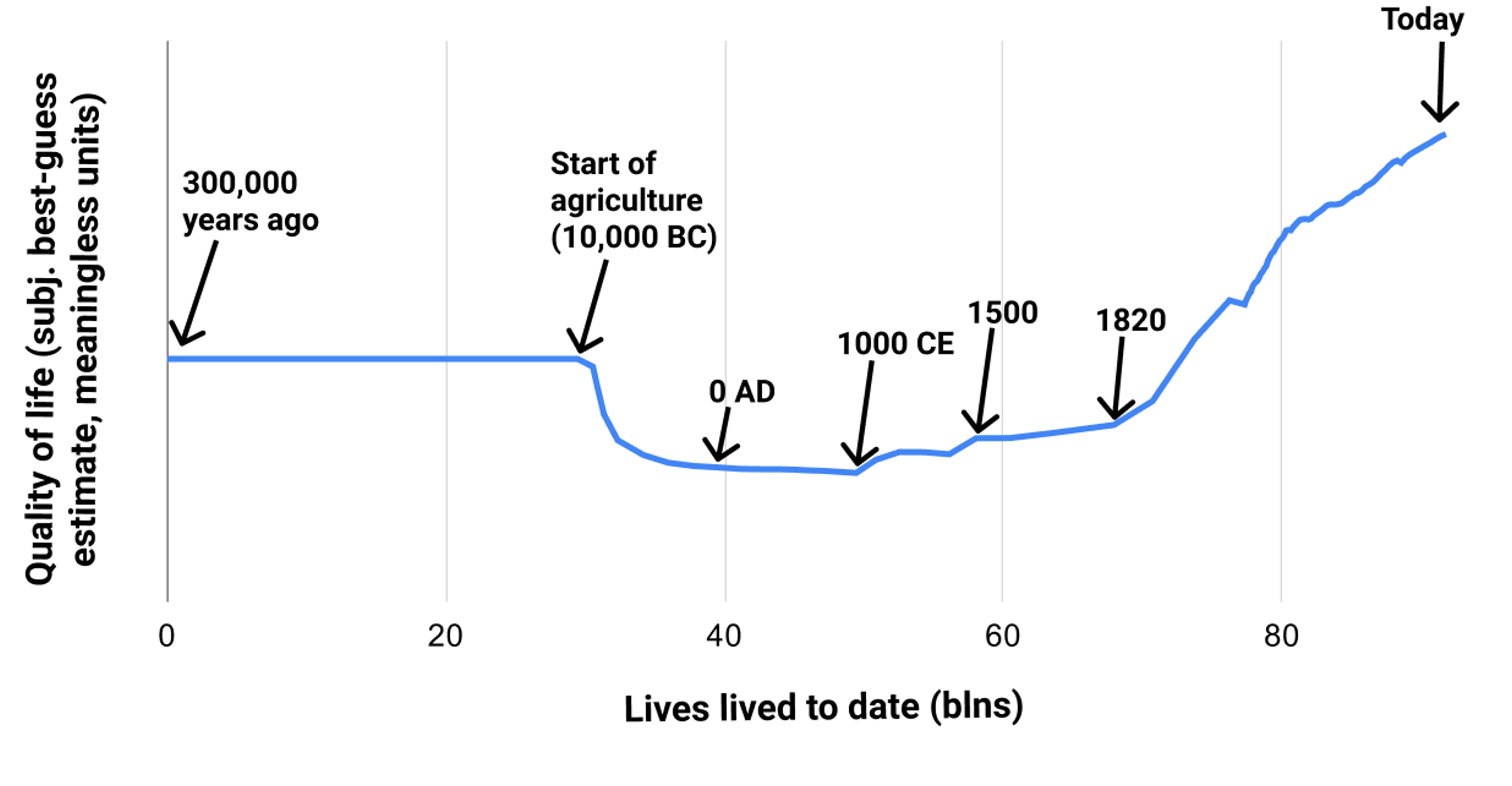It can be hard to look at the news these days without feeling sad. Pandemics, war, climate change — things can seem really bleak. If you feel that way, you're not alone: in a 2015 poll, only 6% of Americans and 4% of Brits thought the world was getting better.

While some things like income inequality or the mistreatment of non-human animals seem to be getting worse, there’s surprising data showing that some things are going much better than you might think. On many measures you can think of — poverty, health, safety — things are much, much better than they used to be. People are living longer, happier and healthier lives than ever before. We've made tremendous headway with improving people's lives even in the last two generations alone, and you can play a significant role in making sure we continue that progress. But to do so, we need to take a balanced view of if the world is getting better or worse.
Let’s start by seeing how it has gotten better.
Poverty has decreased
As an example of the progress we’ve made, take poverty: since 1990, over one billion people have been lifted out of extreme poverty even while the world's population has increased by 2.5 billion people.
Over the long term, things look even better. Just 200 years ago, around 90% of the population lived in extreme poverty. By 2018, it was around 10%.
The reduction in global poverty has enabled all sorts of other positive changes. Life expectancy has shot up all over the world, more than doubling in Africa since 1900.
Health has improved
The number of children who die is rapidly falling, too — the total number of deaths of under-5-year-olds was more than halved between 1990 and 2019, even after considering population growth.
And we're making really good progress on eliminating some of the most deadly parts of life, like malaria, undernourishment and air pollution. Malaria deaths in Africa alone were almost halved in just 15 years.
We're becoming more educated
The improvements aren't just limited to health and poverty. People are also getting more education than ever before; and while 88% of people were illiterate in 1800, 86% of people were literate in 2015.
Violence has decreased
Even in cases where things may have been getting worse in the short-term, looking at long-term trends puts the badness in perspective. Take violent deaths caused by war: looking at the short-term trends, we see things worsened over the 2010s, and this might continue in the 2020s due to the ongoing war in Ukraine. But things were much worse in the 20th century:
What about climate change?
Climate change is another example where, even though things are bad and progress is slow, we might be making a bit more progress than you’d realise. Yes, global temperatures are increasing, and global CO2 emissions have been increasing too. But if we zoom in on some of the major polluters, we can see that advocates for reducing emissions are starting to achieve their goals: emissions are falling in the US, EU and UK.
Consumption-based CO2 has also decreased (albeit more slowly), even though populations have grown and GDP has risen.
The amount of energy generated by renewable sources is rapidly increasing, too. In fact, solar energy deployment has repeatedly outpaced experts' best guesses.
Some things have gotten worse, however
But all this progress doesn't mean we can rest on our laurels.
For one thing, there are some important measures by which things are getting worse — and we need to do something about it. Take inequality, which has been getting much worse in many countries, most notably the United States. And even though we’ve reduced poverty globally, around 700 million people still live on less than $1.90 per day — and that's 700 million too many. Meanwhile, the majority of the world lives on less than $10 a day, which is still an awful lot less than people in rich countries are used to. There are proven ways to improve these people’s economic conditions, such as cash transfers: we just need to give more money to do it.
What about non-human animals?
What's more, although things have been getting better for humans, they've been getting much worse for non-human animals. Biodiversity is plummeting, while meat production is soaring. That means more non-human animals in captivity, many of whom are (and will be) living in awful conditions. If you care about the well-being of non-human animals, this is a very concerning trend — and it means there's room to do a lot more work on improving animal welfare.
The risk of human extinction
Perhaps the most worrying trend of all is the significant increase in existential risk. As Oxford philosopher and Giving What We Can co-founder Toby Ord has written, "for the first time in humanity's long history, we have the capacity to destroy ourselves." We've invented incredibly powerful tools like nuclear weapons, biotechnology and artificial intelligence, all of which have the potential to end civilisation as we know it. And we’ve damaged the environment to such an extent that climate change is likely to harm many people, and, in worst-case scenarios, could even lead to our extinction. That means that while most things have been getting better over time, the risk of human extinction or unrecoverable collapse of civilisation is increasing, not decreasing. Ord thinks that though our existential risk was around 1% throughout the twentieth century, the current risk of existential catastrophe within the next 100 years is 17%.
That's a really high number, and it's why Ord and many other activists donate to initiatives that can lower that existential risk. We’ve made so much progress in the last century, and it would be a huge shame if future generations weren’t around to appreciate it.

We should be optimistic about how much better the world can be
When we put our minds to it, we really can make a difference. Happily, more and more people seem to be realising that: the amount of money committed to effective giving has increased by over 30% a year since 2015. We've achieved a lot in the last century, and there’s still so much we can do. As Open Philanthropy's Holden Karnofsky has shown, for most of human history, our welfare was either fairly stagnant or worsening. The (relatively) recent big increase in welfare we've seen is only due to a phenomenal amount of effort and technological development. That progress should make us optimistic about what can be achieved when we put our minds to it — and help us imagine how much better the world can be for future generations, if we keep working to improve it.
Each of us has the power to help that process: by donating to one of the highly-effective charities we recommend, you can contribute to reducing poverty, fighting climate change, and safeguarding the long-term future. You can also take your impact even further by using your career to work directly on these sorts of problems. Through work like that, we can leave the world better than we found it — and ensure better lives for generations to come.
Resources for learning more
Steven Pinker’s TED talk and book, Enlightenment Now.
Factfulness: Ten Reasons We're Wrong About the World – and Why Things Are Better Than You Think, by Hans Rosling.
Has Life Gotten Better?, by Holden Karnofsky.
The Precipice, by Toby Ord.